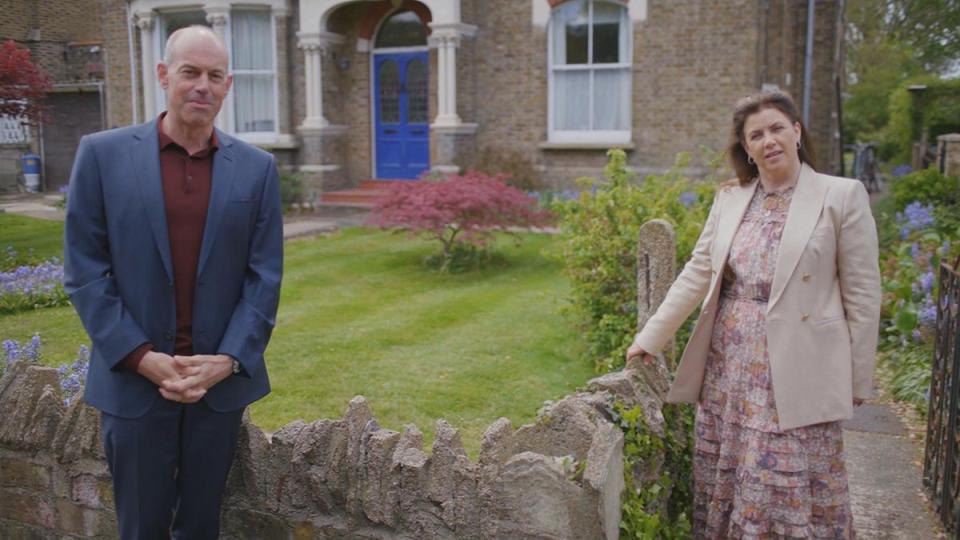Estate agents are awful – here’s why we all need a Kirstie and Phil

We don’t know anything about buying property. We’ve seen a lot of flats that, before we’ve even had a chance to discuss, we got a phone call to say that it’s been sold already.”
Hearing this on the first episode of the new series of Location, Location, Location, I could have been listening to myself three years ago. Like Danit and Rafi, a young couple attempting to buy their first home, in 2021 I was blundering my way through the stressful and opaque underworld of house-hunting with a naivety that, looking back, bordered on stupidity.
“It’s just hard to find something that we like and then move quickly enough and confidently enough,” says Rafi. “We lack in confidence, for sure,” Danit agrees.
Their experience is so similar to mine, in fact, that it’s almost spooky. I too was a first-time buyer, house-hunting in a popular southern seaside town, battling with a frenzied market that moved so swiftly I practically developed whiplash. Unless you were refreshing Rightmove on an hourly basis and booking a viewing within minutes of a property going online, you hadn’t a hope in hell of ever seeing it in the flesh. But that’s where the similarities abruptly ended, because I, of course, didn’t have a Phil Spencer or a Kirstie Allsopp by my side. I just had – shudder – estate agents.
“It’s a big, scary decision, and you’ve not done it before,” Phil, co-presenter of the popular Channel 4 show, reassures the doe-eyed young couple keen to purchase a one-bed flat in Brighton or Hove. “I’ve got some good things lined up, but they do sell. But I’m not going to put any pressure on you.”
I practically swooned when I heard those words. So simple, yet so comforting. So much contained within those two short sentences that the average buyer never, ever gets to experience. Firstly: the sweetly empowering verbal hand-holding inherent in telling someone that it’s OK to not know what you’re doing. Because why would you?
Like sex and compound interest, house-buying is part of a panoply of Really Useful Stuff ™ no one ever teaches you about in school. Searches and surveys; mortgage brokers and best-and-final offers; leaseholds and legal fees: it’s like setting a course into uncharted waters without a compass, map, or even the most rudimentary knowledge of sailing. The first time you do it, you’re simply flying blind.
And though the whole “estate agents are the worst” trope is by now hackneyed to the point of caricature, the fact of the matter is that they really, truly are. It’s not particularly in agents’ interests to demystify the process, either – better to keep you in the dark, and squeeze out a bit more cash by pretending you need to use one of their “recommended” professionals as your solicitor or broker or whatever else, thereby landing themselves even more commission. There’s a reason why just one per cent of Brits consider estate agents “trustworthy” (giving them a lower ranking than lawyers and traffic wardens).

When I was looking – a process I blithely thought might take six months, but in fact it lasted a year and a half – I sought estate agents’ help at first. They were, after all, the professionals – they must know more than I did, surely? They must have some advice or, at the very least, basic information about the buildings on their books? Ha! A quaint notion indeed.
Perhaps it’s different in a slower market, when real effort has to be put in to shift properties, but when I was looking, houses were pretty much selling themselves.
Despite taking a huge bite of the monetary apple once a place sold, the agents I came across were little more than glorified keyholders. They’d turn up, unlock the door, waft their hand in the general direction of the bedroom, and scroll on their phone while I tentatively dipped my head into various rooms and scribbled some nonsensical notes about double glazing and radiator placement in a bid to appear more like a competent adult. Most were unable to answer the most elementary of questions, from what the service charge would be to the length of time left on the lease.
“Not sure,” I remember one lacklustre young woman saying with a half-shrug, as she begrudgingly tore her eyes away from Instagram for a demi-second. “I could ask?” Her tone suggested that doing so would put her out more than anyone in the history of house selling, so I mutely shook my head and mentally crossed it off the list. Compare this with the experience of Danit and Rafi – who had their very own Phil to tell them at exactly what times of day a particular flat’s garden would catch the sun. I looked on in awe, raging with retrospective envy.
Despite taking a huge bite of the monetary apple once a place sold, the agents I came across were little more than glorified keyholders
Second on the fantasy house-hunting bingo card: Phil had already done the hunting part, and got “some good things lined up” for the couple to view. Well, of course he had, you might be thinking – that’s the whole point of the show. But this simple service is something most people I know would have sold their firstborn for, were it available.
The worst part of the buying process – or certainly a contender – is spending more hours than you could possibly calculate checking every single property website, sifting through hundreds of listings, comparing them, favouriting them, ringing up estate agents because no one seems to know how to use email, not getting through, leaving a voicemail, ringing again, arranging a viewing slot, getting a message to rearrange the viewing slot, changing train bookings to get there on time – and then receiving a call on your way there to say that the property’s already been sold.
It was like having a second full-time job, one that brought me zero joy or reward and for which I wasn’t being paid. Imagine the beauty of having a Kirstie or a Phil at the house-hunting helm: someone who’d take you out for a nice coffee, listen to your wants and needs, and then do all the administrative legwork for you, from whittling down contenders to scheduling appointments. It would have reduced my stress levels by 70 per cent, minimum.
And then, finally, those crucial nine words – quite possibly the sweetest nine words in the English language – “I’m not going to put any pressure on you.” What I would have given to be told that! What I would have given to operate without the crushing sense of jeopardy that made every viewing feel like I was trying to deactivate a bomb armed only with a foreign-language instruction manual and a pair of garden shears!
But, instead of having time to have a proper nose around – testing taps, opening cupboards, examining the position and number of plug sockets – I was usually treated to all of 10 minutes at each property before the next prospective purchaser arrived. I’d practically sprint from room to room, my muddled head unable to take in whether it was any better or worse than the other five places I’d seen that day, before being informed smugly by the estate agent that “I’d strongly advise you put in your best-and-final now if you’re interested – we’ve already had seven other offers this morning.”
The biggest purchase I’d made in my entire life, based on a 10-minute shufty. I’ve spent more time deciding whether or not to buy a £15 dress from New Look.
I’m one of the lucky ones – I did eventually manage to buy a house. But it was, quite frankly, one of the more traumatic experiences of my life. So much so that I feel certain it will be at least a decade before I can face going through the whole excruciating process again. My only hope is that, by then, some enterprising start-up is offering a Kirstie and Phil AI hologram of reassuringly middle-class property afficionados to come and hold my hand. Now that really would be a good investment.


